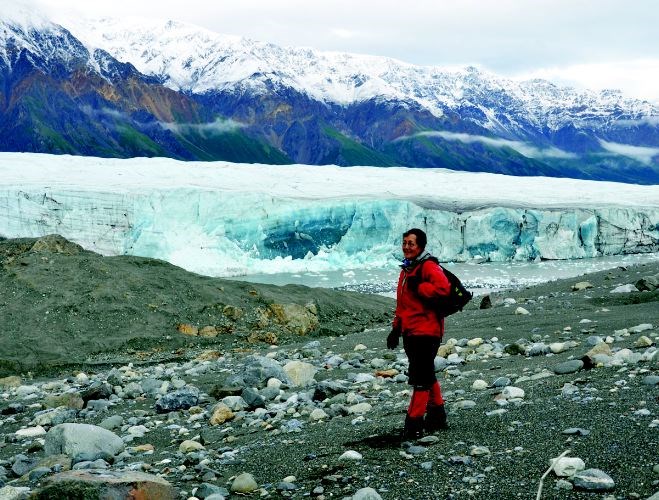Professional jealousies are not quite as old as the subjects in Vivien Lougheed's new book, but they are certainly present in the modern age when it comes to who gets the credit for fossils.
Creekstone Press just released Sidetracked: The Struggle for B.C.'s Fossils by the veteran Prince George writer (formerly with The Citizen).
It talks most about two almost simultaneous discoveries of dinosaur trackways in the local region - one at Tumbler Ridge, the other in Kakwa Park. Both were discovered by amateurs but are now under the control of professional paleontologists.
The Kakwa discovery in particular became a political football between the two men, Garnet Fraser and Bryan Munroe, who found the footprints in stone and the professional paleontologists who took over studying and preserving them, chiefly Richard McCrea of the Tumbler Ridge Museum.
Lougheed steers clear of mere colour commentary of the fight.
"They are both in their own court," she said after a few years researching the topic. "I think I was really fair in presenting that. Nobody is all black or all white."
The book instead focuses on the broader industry of fossil preservation and paleontology research in B.C. and beyond. One theme emerged clearly, said Lougheed, and that is the professionals live in a culture of professional jealousy that often does more harm than good.
"We ended up with stories coming out our ears of amateurs who made major discoveries, who do very good work, but got screwed over by the professionals," said Lougheed. "They [professionals] are passionate about their subject, they are not resourced enough to do as much as they would like, and they want to do their best. But they are not all in it just for the pure science."
Almost all of the major discoveries of fossil sites are by amateurs, Lougheed documented, and were it not for amateurs doing much of the excavation under supervision of professionals, much of it would never be saved for posterity.
The famous Smithsonian Museum, she cited as an example, has more than 2.5 million fossils in their care but only 500,000 are even catalogued. F
ewer still have been studied.
When backlogged professional scientists "protect" a major new site by having it closed to keen amateurs (many of whom are trained and careful in the craft), they often don't get to it in time to save it from natural erosion or in some cases thieves. Amateurs were standing by in vain to do the work.
Lougheed is a travel writer with a shelf of books and boxes of articles she has penned all over the world. She was not a fossil hunter. Her interest was drawn to a hiking anecdote told her by friend Glen Nicholson who also knew Fraser and Monroe.
The two were deep in Kakwa Park in 2000 when they encountered some hunters and an unfriendly exchange ensued over legalities. Monroe and Fraser diverted from their intended route in order to keep the peace. While scanning through binoculars for animal tracks in this new area, Monroe's eyes froze on a rock face that he almost instantly realized was dotted with dinosaur footprints preserved in the mountainside.
"I was really interested in this story of the hike and the confrontation," said Lougheed. "I was going to write it as creative non-fiction but it wasn't long before I switched to straight journalism. It stood up well to a journalistic treatment."
Lougheed will read from the book and present a slide show at 7 p.m. on Sept. 22 at Art Space (upstairs at Books and Company). Admission is free.



